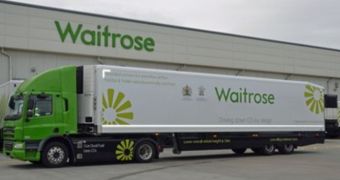British supermarkets chain Waitrose has recently announced that six low carbon lorries are now part and parcel of its delivery fleet.
Talking to the press, the supermarkets chain explained that it took the decision to acquire these vehicles and add them to its distribution fleet in an attempt to save some money and to improve on its ecological footprint at the same time.
Business Green tells us that these six environmentally friendly cars are the result of a collaboration with the University of Cambridge.
Thus, Professor Savid Cebon, who specializes in fuel-efficient trucks, together with Professor Holger Babinsky, who is an expert in vehicle aerodynamics, have both helped develop them.
The same source tells us that the lorries run on a mixture of gas and diesel. In order to reduce their fuel consumption, the specialists who developed them chiefly toyed with their design and looked to reduce drag.
More precisely, the fuel saving measures that they opted for include lowering the height of the vehicle, opting for low rolling resistance tires, and optimizing air flow under the vehicle by means of an aerodynamic truck and trailer design.
Commenting on the supermarkets chain's decision to invest in this initiative and add the six low carbon lorries to its delivery fleet, Justin Laney, Waitrose central transport general manager, stated as follows:
“We're always looking at ways to improve fuel consumption and reduce our carbon emissions, and one of the ways we've looked to do that is by improving the aerodynamics on the lorries we use.”
The supermarkets chain and the specialists who they worked with on this project say that, by making the trucks as aerodynamic as possible, they have managed to reduce drag to such an extent that the vehicles need only a low-powered engine to keep up and running.
They further detail that, thanks to how efficient the lorries are, this engine can also serve to power the refrigerator the trailer is fitted with.
Had this not been the case, the vehicles would have had to be fitted with an additional engine that would have been in charge of refrigeration.
Interestingly enough, the improvements in aerodynamics were achieved without compromising storing space availability or impairing the vehicle's ability to connect with loading bays and other equipment.
Apart from looking to improve on the ecological footprint of its delivery fleet, Waitrose is looking to become more environmentally friendly by trying to halve the amount of packaging that it uses and by seeking to power some of its branches by means of biomass energy.

 14 DAY TRIAL //
14 DAY TRIAL //